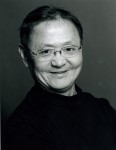Paul Chihara, UCLA professor of theory and composition and head of the Visual Media program, composed the score for the Chinese dance-acrobatic ballet “Yulan: World of Love,” which premiered at East Los Angeles College this week. The ballet will be showing at the Pasadena Civic Auditorium on Oct. 25 and 26.
Daily Bruin’s Natalie Chudnovsky talked to him about the history behind “Yulan,” the production process and his advice to aspiring composers.
Daily Bruin: Can you explain the plot of “Yulan”?
Paul Chihara: It does not have a plot in the traditional sense. It’s about the creation of the universe in 12 sections. Out of the Big Bang come all of these life forms, which immediately come into conflict … (portrayed by) all this incredible dancing and acrobatics. It does have a very happy ending – from all this, the yulan flower emerges and you can hear my tune played by a Chinese instrument, the erhu, which is a two-stringed violin. And then it ends in an apotheosis of beauty. It sounds corny when I describe it, but it’s really quite spectacular.
DB: What is “Yulan”? What is its significance in Chinese culture and to the ballet?
PC: Yulan is a Mandarin name for a flower. It looks very much like a magnolia and is a national flower of Shanghai. It’s a sacred flower in Chinese folklore because in legend, before Buddha became a great religious man, he was a military prince. During a great civil war that raged within China and India, he rode into a city that had been devastated by death and he saw a beautiful yulan flower blooming in the ruins. He meditated on seeing beauty in the midst of death and he wrote a song. That song has disappeared but it’s been a national story of beauty in the midst of death and war … so I wrote a melody that could’ve been that song. That’s the basis, musically, of this show.
DB: When and where did “Yulan” premiere? Are you still touring?
PC: It was performed first in China last year in the city of Dalian. The dancers came from Beijing and the acrobats from Dalian. It was a big success in China and now we’re touring California. We started in the San Francisco area and we’re here now in East L.A. Next week we’ll be in Pasadena. There are 100 people in this company and they’re spectacularly wonderful.
DB: What was the production like? What technical elements were involved and how was it funded?
PC: The production was spectacular. It was a combination of digital visuals, projections, wonderful costumes and scenery and music – all integrated. We worked on it for a year. The music was entered into a computer and many of the designs (visuals projected on the stage) were digitally synced to it. Also you don’t do anything in China without the central government being involved. It was a big production. They gave us $1.5 million.
DB: Did you run into any technical difficulties or obstacles?
PC: This has been the most remarkably smooth collaboration. And I say “remarkably” because we were dealing with two different governments and two sets of artists, those in China and those in America. But we all knew we were doing something special. All four of us Americans went over to China, and being in an exotic place inspired us. I’m chairman of the film music program at UCLA and it’s that background that made it easy for me to work with people in another country, because they all work digitally too. We’ve become a one-world culture with respect to entertainment and technology.
DB: What’s been your most memorable experience on this show?
PC: Going to China. First to Beijing to record with their very good orchestra and then to Dalian to work with the dancers and choreographers. I’m Japanese-American. I’m not Chinese; I don’t speak Mandarin. We’re very different people, the Chinese and Japanese. For me it was a wonderfully liberating and perfect experience to see how well they accepted me and my work.
DB: What advice would you give to UCLA students who want to be in your field and compose for a living?
PC: The No. 1 thing is to stay in school and get as much digital proficiency as possible. And then leave school and never come back. It’s good to get training but once you’ve had it, don’t overdo it. Don’t become too academic. Go out into the world.
